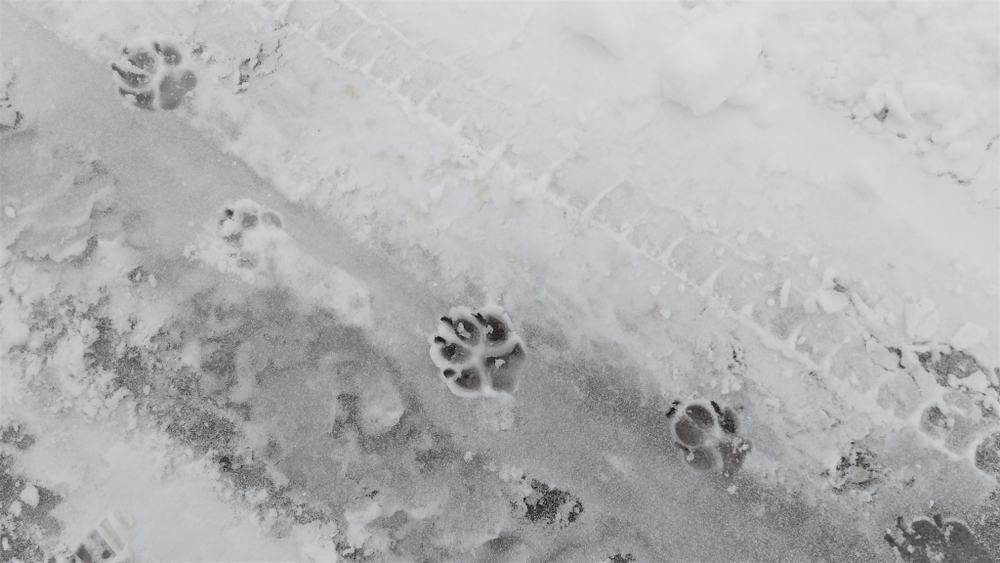Weather conditions in our area can be harsh year-round, with each season bringing a different pet safety hazard. Our main concern for pets during the winter is avoiding cold temperature-related hazards and staying cozy indoors while preventing the dreaded cabin fever. Our Southern Kern Veterinary Clinic team knows what your pet faces during winter, so we’re sharing our favorite cold safety tips and tricks to keep them safe and sane.
#1: Provide adequate shelter for pets
The best way to ensure adequate shelter from wind, moisture, and cold is to keep your pet indoors. If your pet is always outdoors, provide them with a structure that protects them from the elements and elevates them off the cold ground. Provide straw or other bedding and change it frequently, along with ensuring they always have fresh water and food available at all times. Be careful with external heat sources, they can cause burns or fires when installed or used improperly.
#2: Protect your pet from wind
Many dogs are sensitive to wind and cold, especially small breeds, seniors, and pups with short coats, low body fat, and certain health conditions. By outfitting your pal with a windbreaker, sweater, or winter coat, you help protect them from the elements when the weather is at its worst, making a fashion statement in the process!
#3: Limit outdoor time for your pet before dawn or after dusk.
Temperatures in the desert can drop rapidly when the sun goes down, so try to limit your pet’s outdoor activities to the warmer and sunnier times. If you must go out after dark, stay close to home to avoid facing hazards and getting stuck with an injured pet miles from home in dangerous cold. In subfreezing temperatures or windchill levels, limit time outdoors to only a few minutes.
#4: Schedule a winter pet grooming session
Pets with long or thick coats can stay warmer during the winter than pets with short or fine coats, but they need regular maintenance to ensure their fur retains its optimal warmth and insulating properties. Consider a pre-winter professional grooming session or a bath and brush-out at home. Throughout the winter, look for skin or paw pad dryness signs and consider using a protective paw butter or coat conditioner to combat these issues.
#5: Steer pets clear of antifreeze
Antifreeze and deicers contain toxic chemicals. The ethylene glycol in antifreeze tastes sweet and attracts pets to spills or open containers in the garage, and only a few licks can result in rapid organ failure and death. Keep your vehicle maintained to prevent antifreeze leaks, and secure antifreeze containers out of your pet’s reach.
#6: Use caution with pets around heaters and flames
Space heaters, fireplaces, and other supplemental heating elements can be dangerous. A curious pet can increase the risk of an accident, resulting in injury or a house fire. To avoid an incident, use space heaters that have emergency shut-off features, and use fireplace screens that keep your four-legged friend at least a few feet away from the flame.
#7: Provide your pet with indoor enrichment
Pets stuck inside during severe weather can get bored easily and struggle with pent-up energy. Try to get outside when the weather permits, but otherwise, provide your pet with the following indoor activities and intellectual enrichment challenges:
- Play with an interactive toy
- Chew a new bone
- Learn a new trick or practice old ones
- Go on a treat scavenger hunt
- Enjoy a food puzzle toy
#8: Keep pets off slippery surfaces

Wet surfaces can easily freeze overnight, causing slick areas on pavement and sidewalks. Senior pets and those with arthritis are more prone to falls than others because of their reduced strength and mobility, and they are more likely to suffer injuries when they fall. Keep your pet on dirt, sand, gravel, or grass surfaces when possible, and use a pet-safe deicer on slick surfaces immediately surrounding your home. If your pet falls, schedule an assessment with our team.
A little extra care can go a long way to ensure your pet stays warm, healthy, and happy during the chilly winter months. Our Southern Kern Veterinary Clinic team knows healthy pets are more tolerant of cold weather. Contact us to schedule your pet’s routine care visit or nutrition consultation, or to treat health concerns before the coldest weather hits.







Leave A Comment